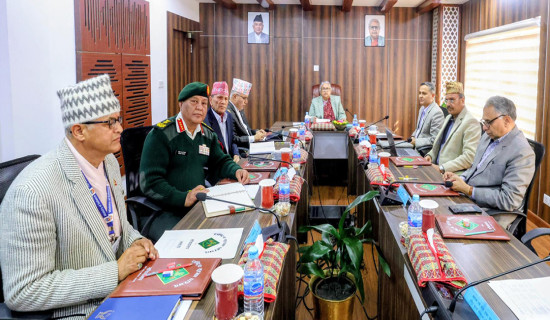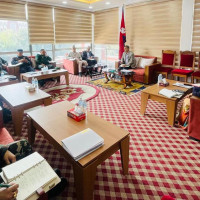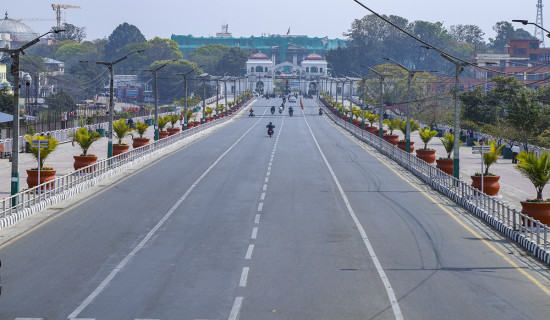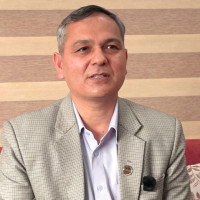- Thursday, 5 March 2026
Priotise To Approve Pending Bills
The legislative process in Nepal often gets derailed as lawmakers representing different political parties in the federal as well as provincial legislatures are rarely found being serious about carrying out such an important responsibility in time. Constant power tussles and blame games among the political forces have frequently led to disruptions of the House proceedings in one way or the other. In the past, there were many instances where the opposition parties caused obstructions to the federal parliament for months just to pile pressure on the government to meet their demands. Still, there is a propensity among the people’s representatives to hold the supreme body hostage when there is a clash between the ruling and opposition parties. It is essential for the parties to shun this sort of ‘culture’ for the benefit of the people and the nation.
It needs no reiteration that dozens of laws that are required for the implementation of federalism have yet to be enacted even after 10 years of the promulgation of the federal constitution. Just about one dozen laws have been framed up by the federal parliament since the second general elections held on November 20, 2022 following the declaration of the new constitution. According to a report, only 111 of the 151 laws that are necessary for the implementation of the constitution have been enacted as of now. This shows that much still remains to be done when it comes to lawmaking for the institutionalisation of the hard-earned federal democratic republican system. Even the government seems to have realised this.
Bill session
The winter session of the federal parliament has recently commenced. This session is considered as the ‘bill session’ because it is supposed to be concentrated on endorsing bills. As soon as the session started, leaders from the opposition parties, including the CPN-Maoist Centre, heavily came down on the government. They blamed the government for failing to address various public concerns. They also accused it of giving rise to corruption and being unable to revive the economy. But the lawmakers belonging to governing parties attempted to defend the government, claiming that the national economy was coming back on track gradually. They said that the government speeded up the process of development while it initiated reforms in governance and the business environment.
Numerous much-awaited bills, including the federal civil service bill and federal police integration bill, have been under consideration in different House committees. But, in view of the current disunion between the ruling and opposition parties, there is no certainty that these bills will get endorsed during this session as well. Despite this, the government and the Speaker of the House of Representatives (HoR) are quite serious about making the winter session more fruitful than the previous ones. In a bid to make the winter session more effective in approving bills, Speaker Dev Raj Ghimire has held meetings with whips and chief whips of the ruling as well as opposition parties. He has also called for finalising the pending bills. This is certainly a commendable initiative. More than one dozen bills are still stuck in parliamentary committees.
The ruling Nepali Congress and CPN-UML are also in favour of approving as many bills as possible during the session. The parties have already decided to play constructive roles in easing the legislative process so as to enact more laws. Even Prime Minister KP Sharma Oli has instructed the lawmakers belonging to his party (UML) to contribute towards getting more bills endorsed. PM Oli is quite concerned about the delay in endorsing the pending bills. In parliamentary democracy, it is the ruling parties that have a bigger role to play in making sure that the parliament has sufficient business and it functions in an effective manner. The House committees are also responsible for making deliberations on the pending bills in time so as to make the legislative process smooth.
To avoid a lengthy lawmaking process, the government had issued six different ordinances some weeks back. They include Ordinance to Amend Some Nepal Acts Related to Good Governance Promotion and Public Service Delivery, Economic Procedures and Financial Responsibility (First Amendment) Ordinance, the Privatisation (First Amendment) Ordinance, and the Ordinance to Amend Some Nepal Acts Related to Economic and Business Environment Improvement and Investment Promotion, Ordinance to Amend Some Nepal Acts Related to Cooperatives, and the Ordinance to Amend Some Nepal Acts Related to Land.
The government has tabled those ordinances in the House of Representatives and the National Assembly for approval through a fast track. As the opposition parties have expressed their reluctance to stand in support of the ordinances, the government is now grappling with a problem. They have flayed the government for opting for ordinances even when bills of similar nature have been under consideration in parliamentary panels. The ruling parties hold a clear majority in the lower house of the federal parliament. So, the ordinances can easily be endorsed by the HoR. But they do not possess majority in the Upper House. Therefore, the leaders of the governing parties have started making efforts to take some fringe parties into confidence for the approval of the ordinances from the upper house.
Adequate homework
Being the lawmaking body, the federal parliament must prioritise the formulation of laws. Lawmakers need to hold extensive discussions on bills before their endorsement. Since parliamentary committees are regarded as a mini-parliament, they also have a crucial responsibility to carry out in finalising the bills in a timely manner. They must remain active. The ministries involved in drafting the bills must do adequate homework while drafting them. The practice of issuing ordinances needs to be discouraged so as to promote collaboration and participation in the legislative process.
(The author is a former deputy executive editor of this daily.)
















